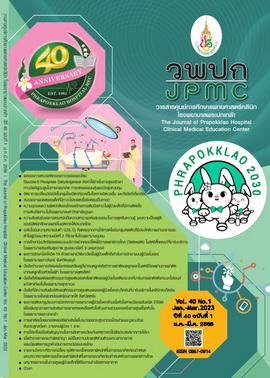Effects of COVID-19 Treatment with Favipiravir on Hospitalized Pediatric Patients at Kohchan Hospital, Chonburi
Main Article Content
Abstract
BACKGROUND: COVID-19 is a novel disease that continues to emerge. Consequently, there are still many unresolved questions regarding the effectiveness of treatment for the disease, especially among pediatric patients.
OBJECTIVES: The study aimed to examine the effects of favipiravir (FPV) on the treatment of COVID-19 by describing the baseline characteristics, clinical features and time to recovery among hospitalized pediatric patients diagnosed with COVID-19, as well as to investigate the effects of favipiravir (FPV) on the treatment of COVID-19 compared to symptomatic treatment (ST). Clinical recovery times were used to measure the outcomes.
METHODS: This was a retrospective observational cohort study carried out from January 1, 2021 to December 31, 2021 at Ko-chan Hospital, Chonburi District, Thailand. Baseline characteristics, clinical features and clinical recovery time among hospitalized pediatric patients aged under 15 years diagnosed with COVID-19 were collected from the medical records of the hospital for this investigation.
RESULTS: A total of 53 pediatric patients were included for analysis, and 27 patients were treated with FPV. They were mostly male (74.1%) and aged between 1-5 years (55.6%). A total of 25.9% were assessed as having mild cases, while 74.1% had moderate cases. The most common clinical features were fever (88.9%) and cough (81.5%). The overall mean recovery time was 3.6±0.3 days (95%CI=2.98-4.22) in the FPV group vs. 4.8±0.3 days (95%CI=4.17-5.52) in the ST group. The Adjusted Hazard Ratio (AHR) was 2.27, 95% CI=1.14-4.52, p=0.02. No difference was observed in the mean time to relieve fever and cough (AHR 1.21, 95% CI=0.62-2.39, p=0.58 and AHR 1.72, 95% CI=0.82-3.62, p=0.15, respectively).
CONCLUSIONS: According to the results of this study on hospitalized pediatric patients diagnosed with COVID-19, it was revealed that most patients were between 1-5 years old. Fever and cough were the main clinical features. Pediatric patients had mild to moderate severity. In comparison to the non-treatment group, the recovery time for all clinical COVID-19 symptoms was shorter with FPV therapy. However, there was no effect on the duration to relieve fever and cough, which was the main symptom experienced by pediatric patients. A larger sample size is needed for additional research, or randomized controlled trials should be carried out to further assess the efficacy of FPV.
Article Details

This work is licensed under a Creative Commons Attribution-NonCommercial-NoDerivatives 4.0 International License.
References
World Health Oganization. Coronavirus disease (COVID-19) [Internet]. [cited 2022 Jan 22]. Available from: https://www.who.int/health-topics/coronavirus#tab=tab_1.
Petrosillo N, Viceconte G,Ergonul O, Ippolito G, Petersen E. COVID-19, SARS and MERS: are they closely related?. Clin Microbiol Infect 2020;26:729-34.
Ministry of Public Health. SARS-CoV-2 variants in Thailand [Internet]. Nonthaburi: Department of Medical Sciences; 2021[cited 2022 Jan 30]. Available from: https://data.go.th/dataset/sars-cov-2-variants
Li B, Zhang S, Zhang R, Chen X, Wang Y, Zhu C. Epidemiological and Clinical Characteristics of COVID-19 in Children: A Systematic Review and Meta-Analysis. Front Pediatr. 2020 Nov 2;8:591132.
Ministry of Public Health. Thai Guideline for COVID-19. Department of Medical Services [Internet]. 2022 [cited 2022 Dec 12]. Available from: https://covid19.dms.go.th/backend/Content/Content_FIle/Bandner_(Big)/Attach/25650929162845PM_25650929131357PM_CPG_COVID-19_v.25_n_20220929.pdf
Manabe T, Kambayashi D, Akatsu H, Kudo K. Favipiravir for the treatment of patients with COVID-19: a systematic review and meta-analysis. BMC Infect Dis 2021;21:489.
World Health Organization. Living guidance for clinical management of COVID-19 [Internet]. 2021 [cited 2022 Feb 13]. Available from: https://www.who.int/publications/i/item/WHO-2019-nCoV-clinical-2021-2
Chen C, Zhang Y, Huang J, Yin P, Cheng Z, Wu J, et al. Favipiravir versus arbidol for clinical recovery rate in moderate and severe adult COVID-19 patients: a prospective, multicenter, open-label, randomized controlled clinical trial. Front Pharmacol [Internet]. 2021[cited 2022 Jan 22];12:683296. Available from: https://www.ncbi.nlm.nih.gov/pmc/articles/PMC8443786/pdf/fphar-12-683296.pdf
de Souza TH, Nadal JA, Nogueira RJN, Pereira RM, Brandão MB. Clinical manifestations of children with COVID-19: a systematic review. PediatrPulmonol 2020;55:1892-9.
Chaiyakulsil C, Sritipsukho P, Satdhabudha A, Bunjoungmanee P, Tangsathapornpong A, Sinlapamongkolkul P, et al. An epidemiological study of pediatric COVID-19 in the era of the variant of concern. PLoS One [Internet]. 2022[cited 2022 Jan 30];17(4):e0267035. Available from: https://www.ncbi.nlm.nih.gov/pmc/articles/PMC9012366/pdf/pone.0267035.pdf
Wu Z, McGoogan JM. Characteristics of and important lessons from the coronavirus disease 2019 (COVID-19) outbreak in china: summary of a report of 72 314 cases from the chinese center for disease control and prevention. JAMA 2020;323:1239-42.
Shinkai M, Tsushima K, Tanaka S, Hagiwara E, Tarumoto N, Kawada I, et al. Efficacy and safety of favipiravir in moderate COVID-19 pneumonia patients without oxygen therapy: a randomized, phase iii clinical trial. Infect Dis Ther 2021;10:2489-509.
Panda PK, Sharawat IK, Natarajan V, Bhakat R, Panda P, Dawman L. COVID-19 treatment in children: a systematic review and meta-analysis. J Family Med Prim Care 2021;10:3292-302.
Tabatabaei SR, Moradi O, Karimi A, Armin S, Fahimzad A, Ghanaie RM, et al. A single-centered cohort study on favipiravir safety and efficacy in pediatric patients with COVID-19. Iran J Pharm Res [Internet]. 2022[cited 2022 Jan 30];21(1):e127034.Available from: https://brieflands.com/articles/ijpr-127034.pdf

